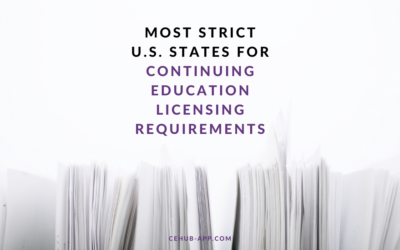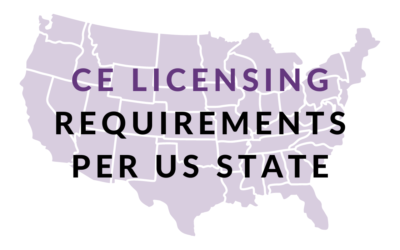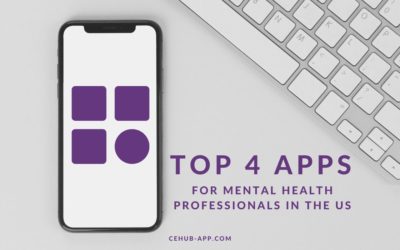Continuing Education Credits are important for therapists to maintain their license and stay updated on new research in the field. But you know what’s a pain? Managing and tracking all of the credit hours you need to stay current. So today we’re covering 12 best practices for managing and tracking your continuing education credits.
1. Make a Plan
The first step to successful CE credit management is creating a plan. Determine how many CE credits you need each year and what types of courses or activities will count towards that total. Having a plan in place will help you stay on track throughout the year and avoid scrambling to find last-minute credits.
A great way to track your credits is through an online CE tracking tool. These tools are convenient, provide you with a record of CE courses that have been submitted, and can save you time when it’s time to submit for your renewal. Still looking for a good one? Try This Free CE Tracking!
2. Take Advantage of Free CE Opportunities
Continuing Education doesn’t always have to be formal courses. There are several free resources available online and in your area. Professional organizations, journals, and CE providers often offer free CE courses and webinars. Keep an eye out for these opportunities and take advantage of them whenever possible.
3. Stick to Your Budget
CE credit can be expensive, but it doesn’t have to break the bank. Keep track of how much you are spending throughout the year on CE credit so you can budget accordingly. Don’t forget, there are several free opportunities out there, so it is good to have a variety of activities to choose from to keep costs low.
4. Be Wary of CE Courses With False Claims
The industry has seen an increase in the number of CE courses that make false claims and do not deliver on the promise of education. Be sure to do your research before enrolling in any course, and if something seems too good to be true, it probably is. A good rule of thumb is to only take courses from reputable providers who are known for providing quality education. You can always double check with your professional board to make sure a company is an approved provider.
5. Get Involved in Your Professional Community
One of the best ways to continue your education is to get involved in your professional community. Attend conferences, join professional organizations, and read journals publishing the work of your peers. These activities will not only help you stay current on the latest research, but they will also help you build relationships with other professionals in your field.
6. Utilize Continuing Education Kits
A great way to save time and money when it comes to your CE requirements is through the use of Continuing Education Kits (or mini-courses). These kits are developed by experts in each field, contain all of the materials you need, and come with a certificate of completion. This takes away the hassle of finding and taking individual courses and can save you money on tuition costs.
7. Get Creative
One of the best ways to learn is by being creative. Try out new methods of learning such as online courses, webinars, podcasts, and MOOCs (massive open online courses). Not only are these methods convenient, but they can also be a lot of fun.
8. Take Notes
Taking good notes is essential for retaining information and staying organized. Whenever you take a CE course, make sure to take detailed notes so you can reference them later if needed. Taking careful notes also shows the CE provider that you are engaged with the material and gives them the opportunity to provide higher quality courses to other professionals.
9. Take Advantage of Trial Memberships
Many professional organizations offer trial memberships that give you access to member benefits such as discounts on CE courses, journals, and conferences. If you are unsure about whether or not an organization is right for you, take advantage of these trials to explore all that they have to offer. You might be surprised by how much you get out of them!
10. Utilize Your Professional Network
Your professional network is one of the best resources for continuing education. Be sure to talk to other professionals in your field and ask if they have any recommendations for activities that will count towards CE credits. These interactions can also lead to new opportunities, collaborations, and even friendships.
11. Ask for Help
If you are feeling overwhelmed or have any questions about your CE requirements, don’t hesitate to ask for help. Your professional organization is a great place to start, and many providers of online CE courses also offer customer support. Don’t be afraid to ask around; you might be surprised by how many people are willing to help.
The landscape of continuing education is constantly changing, and it can be difficult to keep up with all of the latest requirements. Following these simple strategies will help you stay on top of your CE courses and make the most of your educational activities.
12. Make Time for Education
One of the most important things you can do is make time for education. If you are feeling overwhelmed, try not to feel like all of your hard work is going to waste. Instead, use these challenges as opportunities for self-improvement and growth. The more you invest in your education, the more you will get out of it.
Continuing education is an essential part of any professional career. It allows you to stay current on the latest research and developments in your field, build relationships with other professionals, and learn new skills. However, the process of finding and taking CE courses can be overwhelming, especially when you are trying to balance multiple priorities.
Final Thoughts
Continuing education is an important part of any professional career, but especially for therapists. It helps you stay current on the latest research, build relationships with other professionals, and learn new methods and techniques. When it comes to your CE requirements, there are a variety of ways to meet them, so be sure to explore all of your options. The key is to find a balance between quality and cost, so be sure to do your research.
If you’d like more information on organizing your continuing education credits, grab a free trial of our app! CE Hub to download it today, and make filing your audit a breeze.
Do you have a strategy for staying up to date with continuing education? Let us know in the comments below, or let us know if you need help finding online courses that meet CE requirements!
















